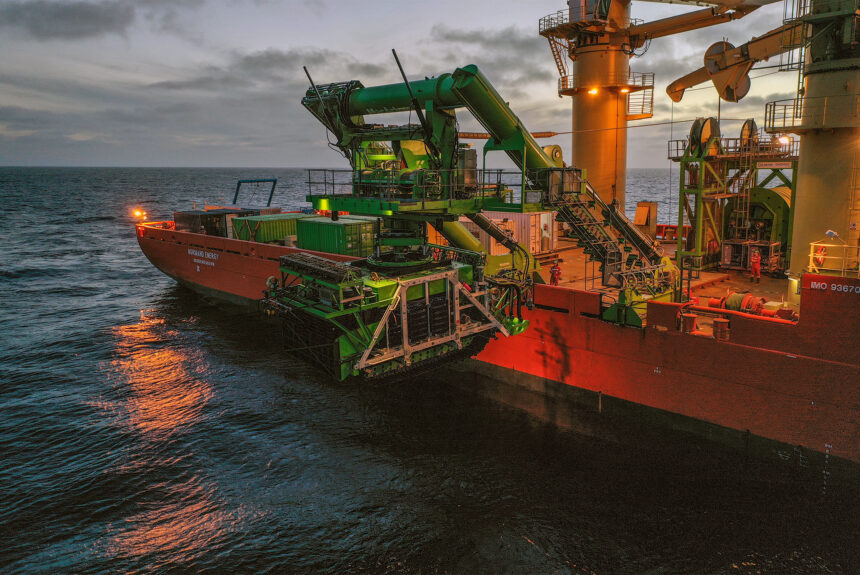Some two-thirds of our planet is covered by water. That is both a challenge and an opportunity. A challenge because many goods must cross the vast oceans as part of the global supply chain. But an opportunity because the ocean serves many purposes. It is a source of food for billions of people. It absorbs CO2 from the atmosphere, thus helping mitigate climate change. And deep sea extraction can provide crucial substances that are needed for a modern, green economy.
>>>READ: Green is the New Gold: Clean Technology Investment Breaks Records in 2022
Let’s start with the environmental benefits the ocean delivers.
The United Nations writes that: “The ocean generates 50 percent of the oxygen we need, absorbs 25 percent of all carbon dioxide emissions and captures 90 percent of the excess heat generated by these emissions. It is not just ‘the lungs of the planet’ but also its largest ‘carbon sink’ – a vital buffer against the impacts of climate change.”
But oceans can be used in another way to mitigate changing climates. They can provide the rare earths that will be needed to build the batteries and wind turbines needed in our low-carbon future.
Rare earth elements (REE) are 17 natural elements that have become essential to America’s national security and economic prosperity. REEs are needed to manufacture a multitude of products, including cell phones, batteries, airplanes, solar panels, satellites, and military technology, among many others.
Right now, roughly 80 percent of the rare earths used in the United States come from China. That makes our green future far too reliant on Red China. The world must find ways to diversify its supply of REEs away from mainland Asia. Tapping the sea floor is an excellent opportunity to do just that.
“Five kilometres deep on the Cook Islands seafloor, potato-shaped rocks pave the bottom loaded with expensive minerals like cobalt, copper, manganese and nickel,” writes Radio New Zealand. The government of the Cook Islands has approved an extraction license that will allow companies to investigate whether harvesting the sea floor is a viable option. This includes studying any environmental risks associated with scooping up the rocks.
Ships would be collecting these minerals and would be anchored far from where humans live, work, or play. That will reduce the environmental impact and would avoid the problems often associated with mining on land.
“Mining has a controversial reputation, including often negative impacts on the environment and unsafe conditions for workers,” writes Anca Gurzu at Cipher. The new book Cobalt Red provides details about those conditions. In Africa, the author “investigated militia-controlled mining areas, traced the supply chain of child-mined cobalt from toxic pit to consumer-facing tech giants, and gathered shocking testimonies of people who endure immense suffering and even die mining cobalt.”
Tapping the ocean floor instead of open pit mines would certainly help reduce the problem of abused workers. Companies would be deploying equipment, rather than humans, to collect the rock from under the sea. It would also eliminate the use of slave labor, since governments could easily determine that everyone on a harvesting vessel is being paid rather than being forced to work there.
>>>READ: How America Can Diversify its Critical Mineral Supply Chain
Another advantage of deep sea mineral collection is that there would be a smaller overall environmental impact. Yes, extraction will disturb the deep sea floor and perhaps some marine life as the rocks are moved to the surface, but keep in mind that this harvesting will occur in the desert of the ocean at depths that are nearly four miles below the ocean surface.
However, by providing the minerals necessary to reduce CO2 emissions, deep sea extraction will contribute to a long-term positive change in the future of the oceans. For example, if humans can reduce the amount of CO2 we emit, oceans won’t have to absorb as much of it. But we need rare earths to make that CO2 reduction possible.
There are plenty of actions that humans should take to protect the oceans such as removing plastic waste, reducing overfishing, and cleaning up ocean pollution. Harvesting the deep sea floor, however, can be done safely and should, over time, improve the life of the ocean by reducing the effects of changing climates. Let’s not let bureaucracy and regulations get in the way of this innovative and environmentally friendly option.
The views and opinions expressed are those of the author’s and do not necessarily reflect the official policy or position of C3.
